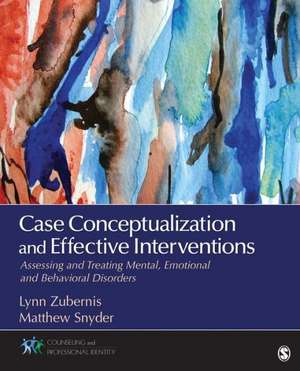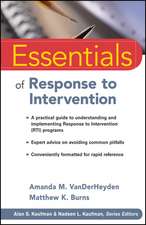Case Conceptualization and Effective Interventions: Assessing and Treating Mental, Emotional, and Behavioral Disorders: Counseling and Professional Identity
Autor Lynn D. S. Zubernis, Matthew J. Snyderen Limba Engleză Paperback – iul 2015
Din seria Counseling and Professional Identity
-
 Preț: 404.23 lei
Preț: 404.23 lei - 23%
 Preț: 719.62 lei
Preț: 719.62 lei - 23%
 Preț: 928.20 lei
Preț: 928.20 lei - 26%
 Preț: 1003.17 lei
Preț: 1003.17 lei - 27%
 Preț: 996.54 lei
Preț: 996.54 lei - 5%
 Preț: 1284.42 lei
Preț: 1284.42 lei - 27%
 Preț: 991.19 lei
Preț: 991.19 lei - 27%
 Preț: 833.37 lei
Preț: 833.37 lei - 27%
 Preț: 985.59 lei
Preț: 985.59 lei - 27%
 Preț: 1088.85 lei
Preț: 1088.85 lei - 27%
 Preț: 785.45 lei
Preț: 785.45 lei - 5%
 Preț: 1026.91 lei
Preț: 1026.91 lei - 23%
 Preț: 622.84 lei
Preț: 622.84 lei - 27%
 Preț: 919.05 lei
Preț: 919.05 lei - 27%
 Preț: 834.76 lei
Preț: 834.76 lei - 8%
 Preț: 522.55 lei
Preț: 522.55 lei - 49%
 Preț: 370.28 lei
Preț: 370.28 lei - 8%
 Preț: 522.55 lei
Preț: 522.55 lei - 8%
 Preț: 522.55 lei
Preț: 522.55 lei - 8%
 Preț: 522.55 lei
Preț: 522.55 lei - 15%
 Preț: 405.98 lei
Preț: 405.98 lei - 49%
 Preț: 368.38 lei
Preț: 368.38 lei
Preț: 724.75 lei
Preț vechi: 979.39 lei
-26% Nou
Puncte Express: 1087
Preț estimativ în valută:
138.72€ • 150.74$ • 116.60£
138.72€ • 150.74$ • 116.60£
Carte disponibilă
Livrare economică 31 martie-14 aprilie
Livrare express 15-21 martie pentru 26.10 lei
Preluare comenzi: 021 569.72.76
Specificații
ISBN-13: 9781483340081
ISBN-10: 1483340082
Pagini: 272
Ilustrații: illustrations
Dimensiuni: 187 x 232 x 14 mm
Greutate: 0.38 kg
Ediția:1
Editura: SAGE Publications
Colecția Sage Publications, Inc
Seria Counseling and Professional Identity
Locul publicării:Thousand Oaks, United States
ISBN-10: 1483340082
Pagini: 272
Ilustrații: illustrations
Dimensiuni: 187 x 232 x 14 mm
Greutate: 0.38 kg
Ediția:1
Editura: SAGE Publications
Colecția Sage Publications, Inc
Seria Counseling and Professional Identity
Locul publicării:Thousand Oaks, United States
Recenzii
"In [this book], Zubernis and Snyder provide counselors-in-training and beginning counselors alike with an excellent resource to assist them in accurately diagnosing and treating clients using current approaches proven to be effective at bringing about change. Through their guided presentation of mental disorders most often encountered by professional counselors, Zubernis and Snyder bridge the gap between theory and practice and prepare counselors to effectively work with diverse client populations."
“This text will help transform how we teach and provide skill development [and] professional identity for our students in the 21st century.”
“This text will help transform how we teach and provide skill development [and] professional identity for our students in the 21st century.”
Cuprins
Chapter 1: A Journey into the Profession
Introduction
A Brief History of Counseling
Who Are We Now? Counseling and Related Professions
Where Are We Now?
Where Are We Going? Looking To the Future
Chapter 2: What Makes Counseling Work?
Introduction
Personal Characteristics of the Effective Counselor
The Therapeutic Alliance
Facilitative Conditions Which Support the Helping Relationship
Transference and Countertransference
Relationship Ruptures
Counselor Self-Awareness
Multicultural Competence
Accountability
Theoretical Orientation
What About the Client?
Pulling It All Together
Chapter 3: Case Conceptualization That Works
Introduction
Diagnosis and Problem Identification
Case Conceptualization
The T/C Model: An Integrative Approach to Case Conceptualization
The Case of Katy
Treatment Planning
Chapter 4: Depressive Disorders
Introduction
Disruptive Mood Dysregulation Disorder (DMDD)
Premenstrual Dysphoric Disorder (PMDD)
Major Depressive Disorder (MDD), including Major Depressive Episode (MDE)
Persistent Depressive Disorder (PDD)
Substance/Medication Induced Depression
Other Specified and Unspecified Depressive Disorders
Comorbidity
Cultural Considerations and Population Factors
Etiology and Risk Factors
Treatment Interventions
Case Conceptualization for Depression Using the T/C Model
The Case of James
Chapter 5: Bipolar Disorders
Introduction
Comorbidity
Cultural Considerations and Population Factors
Etiology and Risk Factors
Treatment Interventrions
Case Conceptualization for Bipolar Disorders Using the T/C Model
The Case of Jason
Chapter 6: Anxiety Disorders
Introductions
Generalized Anxiety Disorder (GAD)
Panic Disorder
Specific Phobias
Social Anxiety Disorder (SAD)
Agoraphobia
Comorbidity
Cultural Considerations and Populations Factors
Etiology and Risk Factors
Treatment Interventions
Case Conceptualization for Anxiety Using the T/C Model
The Case of Jim
Chapter 7: Obsessive Compulsive and Related Disorders
Introduction
Obsessive Compulsive Disorder (OCD)
Body Dysmorphic Disorder (BDD)
Hoarding Disorder (HD)
Comorbidty
Cultural Considerations and Population Factors
Etiology and Risk Factors
Treatment Interventions
Case Conceptualization for OCD and Related Disorders Using the T/C Model
The Case of Sandy
Chapter 8: Trauma and Stress-Related Disorders
Introduction
Acute Stress Disorder (ASD)
Posttraumatic Stress Disorder (PTSD)
Comorbidity
Cultural Considerations and Population Factors
Etiology and Risk Factors
Treatment Interventions
Case Conceptualization for Trauma-Related Disorders Using the T/C Model
The Case of Sora
Chapter 9: Feeding and Eating Disorders
Introduction
Anorexia Nervosa (AN)
Bulimia Nervosa (BN)
Binge-Eating Disorder
Comorbidity
Cultural Considerations and Population Factors
Etiology and Risk Factors
Treatment Interventions
Case Conceptualization for Eating Disorders Using the T/C Model
The Case of Rebecca
Chapter 10: Substance-Related and Addictive Disorders
Introduction
Substance Use Disorders
Comorbidity
Cultural Considerations and Population Factors
Etiology and Risk Factors
Treatment Interventions
Case Conceptualization for Substance-Related Disorders Using the T/C Model
The Case of JJ
Chapter 11: Personality Disorders
Introduction
Comorbidity
Cultural Considerations and Population Factors
Etiology and Risk Factors
Treatment Interventions
Case Conceptualization of Personality Disorders Using the T/C Model
The Case of Jerry
Chapter 12: Disorders With Typical Childhood Onset
Introduction
Autism Spectrum Disorder (ASD)
Comorbidity
Cultural Considerations and Population Factors
Etiology and Risk Factors
Treatment Interventions
Attention Deficit/Hyperactivity Disorder (ADHD)
Comorbidity
Cultural Considerations and Population Factors
Etiology and Risk Factors
Treatment Interventions
Oppositional Defiant Disorder (ODD)
Comorbidity
Cultural Considerations and Population Factors
Etiology and Risk Factors
Treatment Interventions
Conduct Disorder (CD)
Comorbidity
Cultural Considerations and Population Factors
Etiology and Risk Factors
Treatment Interventions
Case Conceptualization Considerations Using the T/C Model
The Case of Phillip
Chapter 13: Case Conceptualization in Practice
Case Conceptualization and the T/C Model
Going Forward: The T/C Model in Practice
Introduction
A Brief History of Counseling
Who Are We Now? Counseling and Related Professions
Where Are We Now?
Where Are We Going? Looking To the Future
Chapter 2: What Makes Counseling Work?
Introduction
Personal Characteristics of the Effective Counselor
The Therapeutic Alliance
Facilitative Conditions Which Support the Helping Relationship
Transference and Countertransference
Relationship Ruptures
Counselor Self-Awareness
Multicultural Competence
Accountability
Theoretical Orientation
What About the Client?
Pulling It All Together
Chapter 3: Case Conceptualization That Works
Introduction
Diagnosis and Problem Identification
Case Conceptualization
The T/C Model: An Integrative Approach to Case Conceptualization
The Case of Katy
Treatment Planning
Chapter 4: Depressive Disorders
Introduction
Disruptive Mood Dysregulation Disorder (DMDD)
Premenstrual Dysphoric Disorder (PMDD)
Major Depressive Disorder (MDD), including Major Depressive Episode (MDE)
Persistent Depressive Disorder (PDD)
Substance/Medication Induced Depression
Other Specified and Unspecified Depressive Disorders
Comorbidity
Cultural Considerations and Population Factors
Etiology and Risk Factors
Treatment Interventions
Case Conceptualization for Depression Using the T/C Model
The Case of James
Chapter 5: Bipolar Disorders
Introduction
Comorbidity
Cultural Considerations and Population Factors
Etiology and Risk Factors
Treatment Interventrions
Case Conceptualization for Bipolar Disorders Using the T/C Model
The Case of Jason
Chapter 6: Anxiety Disorders
Introductions
Generalized Anxiety Disorder (GAD)
Panic Disorder
Specific Phobias
Social Anxiety Disorder (SAD)
Agoraphobia
Comorbidity
Cultural Considerations and Populations Factors
Etiology and Risk Factors
Treatment Interventions
Case Conceptualization for Anxiety Using the T/C Model
The Case of Jim
Chapter 7: Obsessive Compulsive and Related Disorders
Introduction
Obsessive Compulsive Disorder (OCD)
Body Dysmorphic Disorder (BDD)
Hoarding Disorder (HD)
Comorbidty
Cultural Considerations and Population Factors
Etiology and Risk Factors
Treatment Interventions
Case Conceptualization for OCD and Related Disorders Using the T/C Model
The Case of Sandy
Chapter 8: Trauma and Stress-Related Disorders
Introduction
Acute Stress Disorder (ASD)
Posttraumatic Stress Disorder (PTSD)
Comorbidity
Cultural Considerations and Population Factors
Etiology and Risk Factors
Treatment Interventions
Case Conceptualization for Trauma-Related Disorders Using the T/C Model
The Case of Sora
Chapter 9: Feeding and Eating Disorders
Introduction
Anorexia Nervosa (AN)
Bulimia Nervosa (BN)
Binge-Eating Disorder
Comorbidity
Cultural Considerations and Population Factors
Etiology and Risk Factors
Treatment Interventions
Case Conceptualization for Eating Disorders Using the T/C Model
The Case of Rebecca
Chapter 10: Substance-Related and Addictive Disorders
Introduction
Substance Use Disorders
Comorbidity
Cultural Considerations and Population Factors
Etiology and Risk Factors
Treatment Interventions
Case Conceptualization for Substance-Related Disorders Using the T/C Model
The Case of JJ
Chapter 11: Personality Disorders
Introduction
Comorbidity
Cultural Considerations and Population Factors
Etiology and Risk Factors
Treatment Interventions
Case Conceptualization of Personality Disorders Using the T/C Model
The Case of Jerry
Chapter 12: Disorders With Typical Childhood Onset
Introduction
Autism Spectrum Disorder (ASD)
Comorbidity
Cultural Considerations and Population Factors
Etiology and Risk Factors
Treatment Interventions
Attention Deficit/Hyperactivity Disorder (ADHD)
Comorbidity
Cultural Considerations and Population Factors
Etiology and Risk Factors
Treatment Interventions
Oppositional Defiant Disorder (ODD)
Comorbidity
Cultural Considerations and Population Factors
Etiology and Risk Factors
Treatment Interventions
Conduct Disorder (CD)
Comorbidity
Cultural Considerations and Population Factors
Etiology and Risk Factors
Treatment Interventions
Case Conceptualization Considerations Using the T/C Model
The Case of Phillip
Chapter 13: Case Conceptualization in Practice
Case Conceptualization and the T/C Model
Going Forward: The T/C Model in Practice
Notă biografică
Descriere
Taking a humanistic perspective and following an evidence-based approach, the book presents basic case conceptualization skills and is followed by a specific chapter on the most common disorders diagnosed by counselors.













